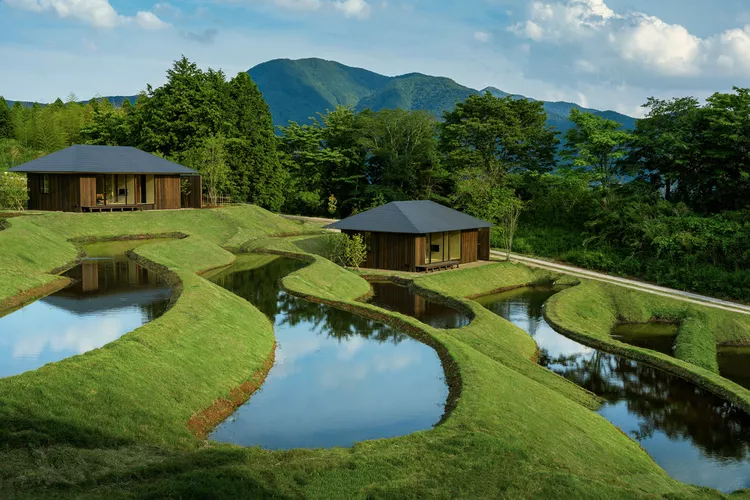Summary
The Call of Kyushu
For the third time in 15 hours, I lowered my body into a hot spring on the slopes of a volcanic peak. During my first dip, the previous day, the sun was glinting off the water; the second soak unfolded beneath a nearly full moon. This time, my pre-breakfast bath was shrouded in morning mist and steam.
The urge to spend almost every second immersed in water is impossible to resist at Kai Yufuin, a new ryokan resort on the island of Kyushu. Japan is known for its hot springs, or onsen, many of which have adjoining bathhouses or inns — and Kyushu is home to more than a third of them.

The volcanic landscapes that heat Kyushu’s springs also give the region its citrus groves and a saw-toothed coastline flecked with emerald islets. However, despite the natural beauty and laid-back tempo, the island is often overlooked by visitors from overseas. On a recent trip from my home in Kyoto, early after Japan began opening up to international tourism, I saw firsthand what awaits travelers — including a new bullet train that shortens the trip between Fukuoka and Nagasaki, two of the island’s main cities, to just 80 minutes.
Journey to Yufuin
My journey began with a more sedate form of transport: the forest-green Yufuin No Mori, an old-school sightseeing train complete with polished wooden floorboards and staff in pinafores serving bento boxes. We departed from Hakata Station in Fukuoka, on Kyushu’s northern shore, and cruised past the Mino Mountains, characterized by remote villages and tumbling waterfalls. Two hours later, we reached Yufuin, a spa town renowned for its hundreds of geothermal springs.

Exploring Oita Prefecture
Yufuin is located in Oita Prefecture — the center of Japanese onsen culture with the most hot springs of any region in the country. Like many hotels in the area, Kai Yufuin has one on-site. The property was designed by starchitect Kengo Kuma and boasts 45 modern guest rooms in a jewel-green valley of cascading rice fields. It’s truly a backdrop worthy of a woodblock print.
Refreshed by my countryside stay and eager to experience more of the island, I headed west to Saga Prefecture — a picturesque region known for its crafts, such as porcelain and furniture, along with its rich tea heritage. In Ureshino, believed to be the 12th-century birthplace of tea in Japan, I sampled several Kyushu specialties at Tea House Tokunaga. This 76-year-old company is part of the Saga Collective, a group of sustainable, family-run producers in the region.

Coastal Adventures to Nagasaki
Next, I ventured to the coast, made faster thanks to the Nishi Kyushu Shinkansen, which debuted last fall. This newest bullet train reaches a top speed of 161 miles per hour, connecting Takeo Onsen with Nagasaki in just 23 minutes. After boarding the streamlined white-and-red train, I soaked in the passing views.
Upon my arrival in Nagasaki, I navigated through the hilly city by tram before catching a ferry to the Goto Islands. Located about 60 miles off Kyushu, the archipelago is renowned for its seafood, udon, camellias, and wild mountainous landscapes. The largest island, Fukue, is home to one of Japan’s newest design hotels: Goto Retreat Ray.

Stay at Goto Retreat Ray
Designed by the late Yukio Hashimoto, the hotel features dramatic monochrome spaces with glass walls on one side, fully capturing the forested peaks and turquoise waters outside. While there are no hot springs, every room boasts its own outdoor bath; after checking in, I savored the fresh, salty air and lowered myself once again into the hot water, gazing out at the sea and sky.
A version of this story first appeared in the April 2023 issue of GoTravelDaily under the headline “The Call of Kyushu.”





